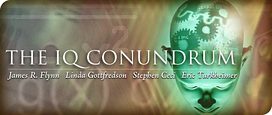Before we abandon the topic of full discussion of race differences, everyone should read Mill’s classic, On Liberty. Mill warns us that governmental censorship is often not the main threat but rather the force of public opinion. He reviews the historical record and shows that all past restriction on open debate was counterproductive, which raises the question: do we live in the one time that is an exception to the rule?
Mill also emphasizes the positive value of a challenge to even true beliefs. Without this, they become stale Sunday truths without vitality because no one is practiced in defending them. If there is any belief that had become a Sunday truth among U.S. social scientists by 1960, it was that all groups were equal on average in cognitive ability. Everyone took it for granted, just as a conventional Christian went unthinkingly to church to practice the faith of his parents.
Imagine that Arthur Jensen had been persuaded not to publish his 1969 article on race. Not by law but by subservience to the public opinion of his colleagues. I would never have made any contribution to psychology. It was arguing versus Jensen that led me to investigate IQ trends over time, led me to formulate a more sophisticated defense of affirmative action, led me to my book What Is Intelligence, which (I hope) has done much to unfreeze our thinking about g, or the general intelligence factor.
It was arguing against Jensen that led Bill Dickens’ step by step towards the the Dickens-Flynn model, which in in turn has inspired Maas’ new model. Would Eric Turkheimer have ever put forward his wonderfully acute analysis of g without the flow of ideas that originated with Jensen’s article? If there is any debate that illustrates Mill’s point, it is the Jensen debate.
Reality is like a ball of twine and when debate pulls one thread loose, it begins to unravel and much is understood. Full debate is far more productive of truth than a prize fight in which force (law) legislates “truth”. It is also far better than a shouting match in which someone is intimidated by disapproval, difficulty in finding a journal in which to publish, fears about promotion.
It may be said that truth is not the only value. A colleague once told me that all that has been learned in the wake of Jensen was not worth hundreds of acts of discrimination, those that may have occurred from naive racists feeding on his views. Rousseau said that same thing about those who argue for atheism: is this single truth worth the danger that thousands of people of simple faith will become immoral, rather than acing responsibly?
I side with Mill: if only one peson held a view, however repugnant or wrongheaded, and all mankind were united against him, he would have as much right to free speech as they. And no one should discourage exercise of that right.

